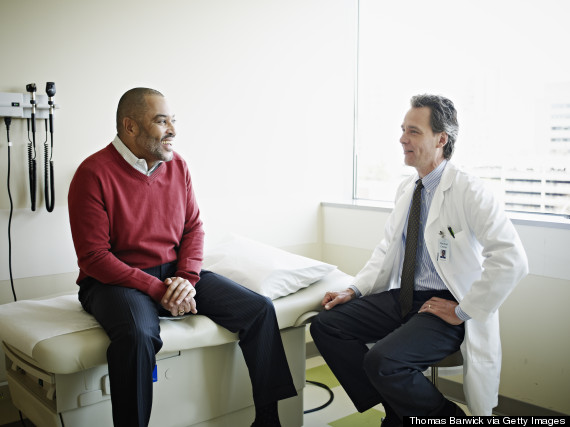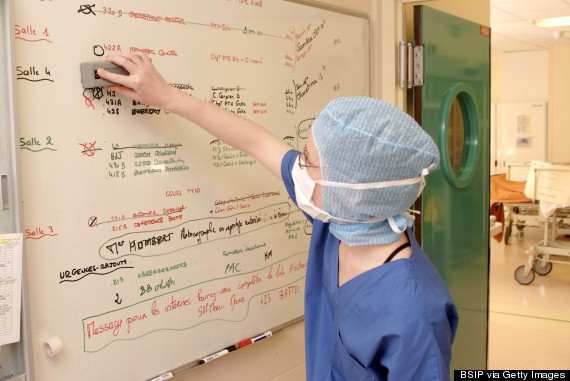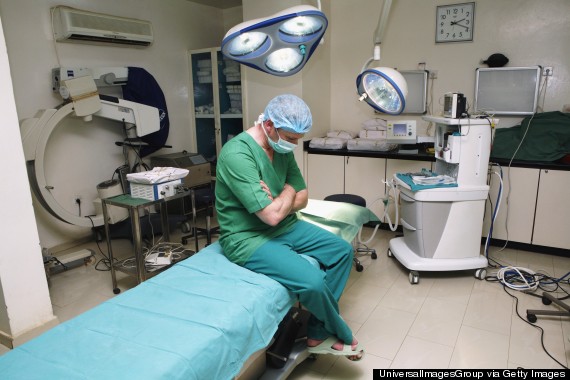
Let’s be honest: No one goes to the hospital to relax. Getting there, whether for a medical emergency or a scheduled appointment, is overwhelming -- especially when you’re worried about a loved one. And once you arrive, the situation only seems to feel more tense.
However, there are a few ways to keep your trip from becoming too chaotic. According to Dr. Jim Merlino, a chief experience officer at the Cleveland Clinic, making your hospital visit less stressful is all about eliminating the uncertainty.
“We spend an enormous amount of time, energy and resources educating patients about their disease and how to treat it, but no one talks about what it is like to be a patient … We don’t have those discussions in health care and we need to,” Merlino tells The Huffington Post.
Your experience at the hospital will depend in part on the questions you ask and discussions you as the patient or family member initiate. Dr. Neil Calman, a professor and chair of family medicine and community health at Mount Sinai Hospital in New York, says it’s important to remember the role you play in your own health care.
“People assume healthcare happens on automatic pilot and that there’s one way for everything to get done because providers are very directive,” Calman tells HuffPost. He says the key is to ask about options and discuss what’s going on.
If you happen to end up in the hospital (either with a loved one or for yourself), these tips will help you feel calm and in control. Below are seven things you should know before making a hospital visit.
Get an idea of what it’s like to be a patient before you’re admitted.

At the Cleveland Clinic, Merlino says the emphasis lies with managing the patient’s expectations as best as they can -- this includes talking about how it will feel to be a patient. “When you take the extra time to discuss, the patient is better prepared for the environment and not surprised,” Merlino explains. This simple conversation can take away some of those uncertain feelings.
Merlino also suggests that if caretakers don’t address the questions you have, it’s better to ask. You are the best advocate for your health. You should feel comfortable talking about everything -- from the people you’ll be dealing with in the hospital to who you can contact and what you should do when you get home. “Don’t stop until you have a complete understanding of the experience,” he says.
Prepare what you can before you arrive.
Certain tactics can help you prep before you even have a reason to go to the hospital. Calman suggests talking with your primary care physician about your medical records and keeping them current and readily accessible. “When you’re really sick your head is not in a place where it's easy to remember a lot of these things,” he says, which makes it all the more important that you do these things before an emergency happens.
Before you leave for a scheduled appointment, also be sure to check into what paperwork you may be able to complete ahead of time. Most hospitals will have the information available to patients on their website. According to University of Chicago Medicine, it’s important to try to remember at least four “must-haves,” depending on your situation -- your social security card, your insurance card, a photo ID and a form of payment just in case there are some things that are not covered by insurance. If you’re scheduling a surgery, talk with your physician beforehand to find out if there are other necessities you should bring or ways to prepare.
The layout of the hospital isn’t as confusing as it seems.

Merlino admits navigating a hospital environment can be difficult -- and that even includes where you park your car. In a place like the Cleveland Clinic, with a campus that stretches across 176 acres 46 buildings, it’s easy to accidentally park three blocks away from where you need to go. If you’re scheduling an appointment or surgery, before you get to the hospital, make it a point to ask where the nearest available parking is.
Before panicking in the chaotic halls, check for maps and look for markers you can remember along the walls -- whether it’s a piece of artwork, or a colorful door. Many hospitals are beginning to integrate the process of wayfinding, or an easier way of instructing patients as to where they need to go and where they are. These wayfinding techniques also include banners for parking and labeling buildings. By staying alert to the certain markers, it’ll be easier to alleviate some stressful components of your stay.
Know when to make an appointment and when it's time for the emergency room.
“Anytime a patient perceives their pain as an emergency, it’s time to call 911 or go to emergency department,” says Merlino. The important thing to remember is to understand who can help you and where if you need it after hours. Make sure you ask questions before leaving your physician to become better informed.
“The emergency room can be extremely chaotic at times,” Calman says. “Sometimes people just get forgotten.” For that reason, it’s totally acceptable to ask when someone can see you, given that a reasonable amount of time has passed. “People have to be less afraid to become equal partners with healthcare providers,” he says.
Some times may be better than others when it comes to scheduling a surgery.

While there have been some suggestions as to what days are best to schedule a surgery, such as being the first appointment of the day, Merlino says there’s no real evidence as to when the "best" time is -- it all depends on what mutually works for the patient and surgeon.
However, patients should be aware of a surgeon’s block time, as it refers to the day doctors are able to control their schedule of surgeries. Merlino explains that while other days may seem more convenient, hospitals use these block times in order to better manage the efficiency of the operating rooms. Merlino also says that scheduling something during a block time gives a better guarantee that you will be seen at that time, compared to other days when there is a potential for you to get bumped.
According to U.S. News, there could be some merit in avoiding surgeries during the summer months, but only if you have the flexibility to do so. Teaching hospitals usually begin new residencies in June and July, so talk with your physician about what kind of care works best for you.
Know how long your doctor has been working.

Physicians are increasingly facing burnout symptoms and emotional distress. A recent study published in the journal Academic Medicine found that medical students are reporting significantly higher burnout rates compared to those of their fellow college graduates, which is mostly attributed to emotional exhaustion. In order to prevent doctors from getting too overwhelmed, hospitals such as the Cleveland Clinic are creating programs to alleviate the burnout problem and many programs and hospitals are working to regulate how many hours physicians can log.
If you’re nervous about your doctor's wellbeing, Merlino says it’s perfectly acceptable to inquire how long your physician has been on the clock. “There’s no inappropriate questions a patient can ask a physician. Other than something really personal, there’s nothing off the radar,” Merlino says. “[Doctors are] dealing with people in the worst possible situation of their lives. They’re fearful, they have anxiety and uncertainty. If a caregiver gets offended, those patients should find a different physician.”
The hospital staff is there to help you.
Everyone from the doctor who performs your surgery to the maintenance employee who brings you ice chips in the waiting room plays an important role in helping you get the care you need. In a 2013 Huffington Post blog, psychiatrist Elana Miller detailed her journey with cancer, including the touching treatment she received from hospital doctors and staff. “Love is when every single staff person in the hospital, from nursing to care management to the custodians, treat me kindly and compassionately,” she wrote.
Everyone in the hospital can help you in some way, so take advantage of their expertise. Calman recommends keeping a spiral notebook on hand during your stay to keep notes in. Keep track of who comes into your room to talk to you, who gives you medication and what drugs are being administered. Also use that notebook to write down questions. It can be overwhelming when you only get a small amount of time to talk to a doctor, and jotting down your thoughts ahead of time can help you remember when the time comes. "When people ask for options and engage in discussions ... they can make informed decisions on treatment," he says.
